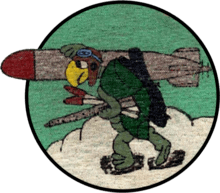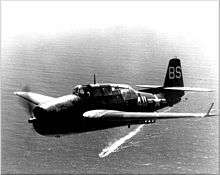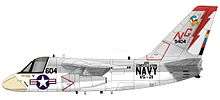Sea Control Squadron 21
| Sea Control Squadron TWENTY ONE (VS-21) | |
|---|---|
 Original VS-41 insignia | |
| Active | 26 March 1945 - 28 February 2005 |
| Country | United States |
| Branch | United States Navy |
| Role | Anti-submarine warfare |
| Size | Squadron |
| Home Port |
NAS Seattle NAS San Diego NAF Atsugi |
| Nickname(s) | Fighting Red Tails |
| Aircraft |
TBM-3 Avenger S-3 Viking |
| Insignia | |
| VS-21 (1955) |
 |
| VS-21 |
 |
| VT-41 |
 |
Sea Control Squadron TWENTY ONE (SEACONRON 21 or VS-21), previously designated Air Anti-Submarine Squadron TWENTY ONE (AIRASRON 21), Composite Squadron TWENTY ONE (VC-21), Attack Squadron ONE E (VA-1E), and Torpedo Squadron FORTY ONE (VT-41), was a United States Navy anti-submarine (ASW) squadron established in the final year of World War II, which served after the war aboard Badoeng Strait helping to develop hunter-killer ASW tactics for the Navy, and ultimately operated from full-size aircraft carriers in the sea control role, capable of anti-submarine and anti-surface warfare. It was the only squadron to receive the designations VA-1E, VC-21, or VS-21.[1]
History
The squadron was established as Torpedo Squadron FORTY ONE (VT-41) at Naval Air Station Seattle, Washington, under the command of Lieutenant Joseph P. Keigher, with the General Motors-built TBM-1, TBM-1C, and TBM-3 Avenger torpedo bomber as part of Escort Carrier Air Group FORTY ONE (CVEG-41). Commander Air Force Pacific Fleet had designated the squadron upon formation as having antisubmarine warfare as its primary mission. On 15 November 1946, as part of a service-wide reorganization, VT-41 was redesignated Attack Squadron ONE E (VA-1E), which was translated into "1st attack squadron ("VA-1") based on escort carriers ("E")", while CVEG-41 was simultaneously redesignated Escort Carrier Air Group ONE (CVEG-1). The Group, which consisted of VA-1E and its sister fighter squadron VF-1E, was assigned on 4 December 1946, to the escort carrier Badoeng Strait, and VA-1E was identified by the tail code "BS" (call sign "Beef Steak"). In 1947-1948, VA-1E conducted regular ASW exercises aboard Badoeng Strait between the US West Coast and the Western Pacific. The squadron saw extensive service in ASW trials and tactics development aboard Badoeng Strait.[1] When the US Navy turned back to the designation system used before November 1946, both CVEG-1 squadrons VA-1E and VF-1E were merged into Composite Squadron 21 (VC-21) on 1 September 1948, creating one of six new anti-submarine squadrons. The squadron was redesignated Anti-Submarine Squadron 21 (AIRASRON 21 or VS-21) and obtained the nickname "Redtails" on 23 April 1950. After putting the S-3B Viking into service in 1991, on 1 October 1993, the squadron was redesignated Sea Control Squadron 21 (retaining the abbreviated form VS-21). VS-21 was finally disestablished on 28 February 2005.[2]
Commanding officers
- Lt. Joseph P. Keigher: 26 March 1945 (acting commander)
- Lt. Charles A. Collins: 29 April 1945
- LCdr. Kent M. Cushman: 14 September 1946
- LCdr. Harold A. Robinson: 24 November 1947
Aircraft Assignment


- TBM-1 Avenger from March 1945
- TBM-1C Avenger from March 1945
- TBM-3 Avenger from March 1945
- TBF-1 Avenger from April 1945
- TBM-3E Avenger from May 1945
- TBM-3S Avenger from 1948
- AF-2 Guardian
- S2F-1 Tracker
- S2F-2 Tracker
- S-2E Tracker
- S-3A Viking
- S-3B Viking from 1991
Air Wing Assignments
- Escort Carrier Air Group FORTY ONE (CVEG-41) from 26 March 1945 to 15 November 1946
- Escort Carrier Air Group ONE (CVEG-1) from 15 November 1946
- Carrier Air Wing One (CVW-1) (1974 - 1976)
- Carrier Air Wing Fifteen (CVW-15) (1978 - 1980)
- Carrier Air Wing Two (CVW-2) (1981 - ?)
- Carrier Air Wing Five (CVW-5)
See also
| Wikimedia Commons has media related to Sea Control Squadron 21 (United States Navy). |
- History of the United States Navy
- List of inactive United States Navy aircraft squadrons
- List of United States Navy aircraft squadrons
References
This article incorporates text from the public domain Dictionary of American Naval Aviation Squadrons.
- 1 2 Grossnick, Roy A. (1995). "VA-1E" (pdf). Dictionary of American Naval Aviation Squadrons. Naval Historical Center. 1. Washington, DC: Department of the Navy. p. 17.
- ↑ Donald, David; Lake, Jon (1992). US Navy & Marine Corps Air Power Directory. Aerospace Publishing.
